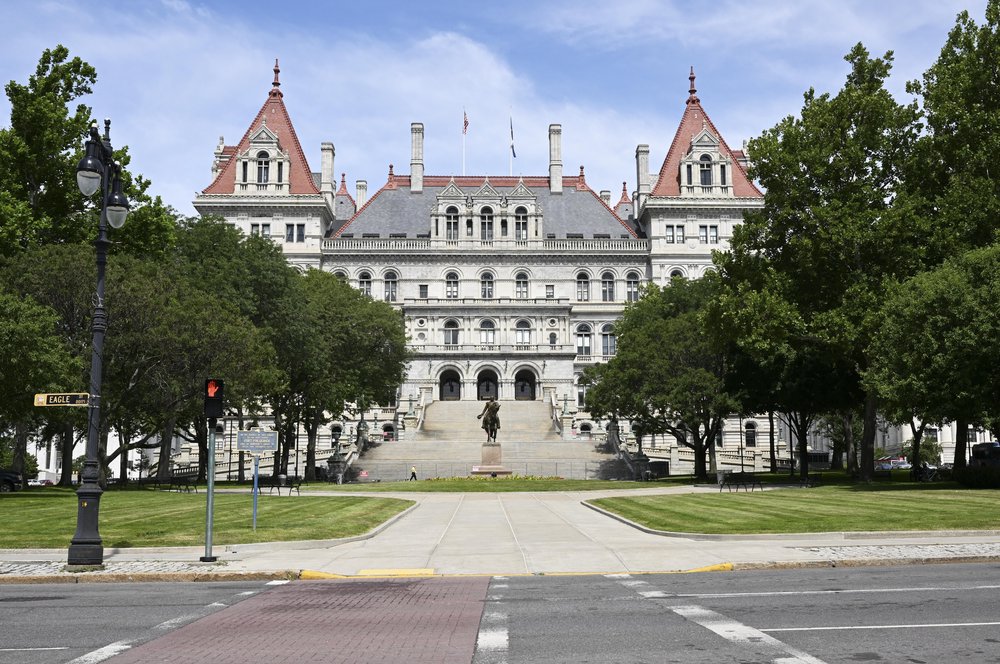NY lawmakers, weighing a pay hike, would have to act soon
Dec. 18, 2022, 3:29 p.m.
State lawmakers will have to approve a pay increase by the end of the month if they want it to take effect next year.

As New York state lawmakers weigh an end-of-year return to Albany to hike their own pay, good government organizations are hopeful it could finally lead to a reform many of them have been pushing for well over a decade: A meaningful cap on outside income.
The state’s 213 lawmakers are technically considered part-time, meaning they are permitted to take on private work that delivers an income outside of their current legislative salary of $110,000 a year. Many of them do.
Democratic Sen. Luis Sepulveda of the Bronx, for example, took in at least $50,000 last year for his work as a private attorney, while Assembly Republican Leader Will Barclay earned at least $30,000 from his law firm, according to financial disclosure forms.
Now, legislative leaders are negotiating a potential legislative pay increase to $130,000, which would make them the highest-paid state lawmakers in the nation. But government reform advocates have pleaded with them to pair it with strict limits on outside pay, which they say will help cut down on conflicts of interest for lawmakers who may otherwise have their allegiances split between their constituents and their clients.
“Certainly there should be a limit on outside income, even if they don't do a pay raise,” said Blair Horner, executive director of the New York Public Interest Research Group.
There are 150 members of the state Assembly and 63 members of the state Senate. Each takes home a $110,000 base salary, plus a $183 per diem for each night they spend in Albany. About a dozen lawmakers also earn stipends for leadership posts.
Under the state constitution, the Legislature is in charge of setting its own pay rate — but it can only increase that salary for future legislative sessions. With the next session slated for January, the Legislature is currently in a sweet spot — after Election Day, and before the start of the new session — where they could hold a special session to increase their pay with limited political blowback.
Senate and Assembly leaders have had talks about doing just that, in part because a state pay commission had previously recommended a raise to $130,000 by 2021 — before the state courts invalidated it because the commission had overstepped its legal bounds by tying that pay hike to a 15% cap on outside income, similar to the cap imposed in Congress.
That was beyond the commission’s legal authority, according to the court.
Good government groups are calling on legislative leaders to keep both ends of the bargain: If they’re going to vote for the raise to $130,000, they also need to vote for the limit on outside pay, too.
A group of advocates — including Common Cause New York, NYPIRG and Reinvent Albany — wrote to Gov. Kathy Hochul last week, urging her to support a cap. Along with the 15% limit, they also said they want to ban lawmakers from having a “fiduciary” responsibility to any clients, which could in effect rule out legal work.
Hochul would have to sign any pay increase into law in order for it to take effect.
“We urge Governor Hochul to include consideration of a ban on income earned through certain professions and a cap of up to 15% on certain permissible outside income from select professions in any proclamation calling for a special session addressing salaries and we urge both houses of the Legislature to pass such a measure,” the groups wrote. “It remains our organizations' position that there must be a Congressional-style limit on outside income.”
Hochul has already expressed support for a pay raise for lawmakers. On Thursday, she signaled support for an outside pay cap, too.
“That seems to be, if you were having a pay increase, that that would be something that would be I would think in the interest of transparency and accountability that people would expect,” she told reporters at the Capitol.
But some lawmakers said they have their concerns.
Outgoing Assemblymember Tom Abinanti, D-Greenburgh, Westchester County, is an attorney who has practiced on what he calls a “very part-time basis” while he was in the Assembly. He earned at least $20,000 last year for his work as the executor of an estate, according to his financial disclosure form.
He said he took on a client here and there over the years in order to keep his firm active and his malpractice insurance up to date. If he hadn’t, he’d be starting from scratch now that he’s leaving the Legislature, he said.
“I'm a perfect example of why you don’t want to prevent people from having some kind of an outside occupation,” said Abinanti, who lost a Democratic primary earlier this year. “I was in the Legislature for 12 years. If I didn't keep my law practice up, I would be starting all over again.”
Republican leaders, meanwhile, have pushed back against the idea of a special session to increase their pay. Their say, however, is quite limited: Democrats hold large majorities in both the Senate and Assembly.
“Inflation is surging. Energy bills are spiking. Gas is going up again. Cost-of-living is through the roof,” Senate Minority Leader Rob Ortt tweeted last week. “Now is NOT the time for Albany Politicians who created these problems to get a pay raise.